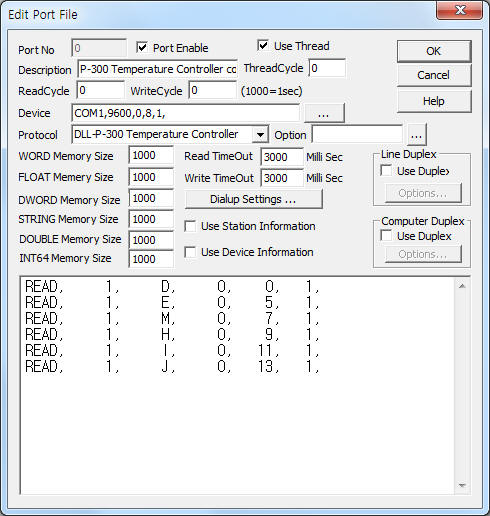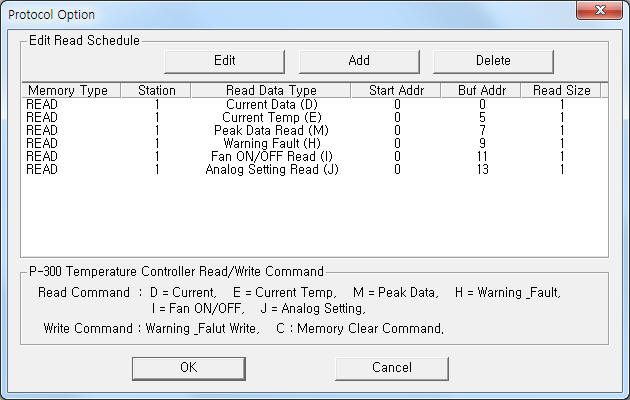
P-300 Temperature Controller communication driver is the driver to communicate with temperature controller of Digital Korea CO., LTD. in Korea.
<Figure 1> is read setting example of P-300 Temperature Controller communication driver.
 |
| <Figure 1> Read setting example of P-300 Temperature Controller communication driver |
Device part of <Figure 1> input Com Port(COM1), Baud Rate(9600), Parity Bit(0), Data Bit(8), Stop Bit(1) respectively, according to setting of controller.
P-300 Temperature Controller communication driver¡¯s read schedule
Read schedule setting parameters are as follows:
1) Station – Controller station number = 1 ~ 31.
2) Read Command – Command = D, E, M, H, I, J. ( refer to <Table 1> )
D : read of R phase temperature and LED status, external status,
E : read of S, T phase temperature,
M : read of Peak value,
H : read of Warning & Fault setting,
I : read of Fan ON/OFF setting,
J : read of analog output setting.
3) Read Start Address – Don't care.
4) Save start address for Communication Server – Saving start address of Communication Server.
5) Read Size – fixed to 1. ( refer to <Table 1> )
Read schedule example)
READ, 1, D, 0, 0, 1,
READ, 1, E, 0, 5, 1,
READ, 1, M, 0, 7, 1,
READ, 1, H, 0, 9, 1,
READ, 1, I, 0, 11, 1,
READ, 1, J, 0, 13, 1,
<Table 1> is read command and contents of P-300 Temperature Controller communication driver.
<Table 2> is bit position and contents for LED status.
| Read command | Contents | Data saving address |
| D | read of R phase temperature and LED status, external status | Start addr + 0 : R phase temperature (real value ¥ª 100) Start addr + 1 : LED status (refer to <Table 2>) Start addr + 2 : external status(Fan ON/OFF status) |
| E | read of S, T phase temperature | Start addr + 0 : S phase temperature (real value ¥ª 100) Start addr + 1 : S phase temperature (real value ¥ª 100) |
| M | read of Peak value | Start addr + 0 : Peak High (real value ¥ª 100) Start addr + 1 : Peak Low (real value ¥ª 100) |
| H | read of Warning & Fault setting | Start addr + 0 : Warning setting (real value ¥ª 100) Start addr + 1 : Fault setting (real value ¥ª 100) |
| I | read of Fan ON/OFF setting | Start addr + 0 : Fan ON setting (real value ¥ª 100) Start addr + 1 : Fan OFF setting (real value ¥ª 100) |
| J | read of analog output setting | Start addr + 0 : analog output setting High byte Start addr + 1 : analog output setting Low byte |
| <Table 1> Read command and contents of P-300 Temperature Controller communication driver | ||
Bit position |
Contents |
7 (MSB) |
FAN/MAN |
6 |
FAIL |
5 |
FAN-ON |
4 |
FAULT |
3 |
WARNING |
2 |
T Position |
1 |
S Position |
0 (LSB) |
R Position |
| <Table 2> Bit position and contents for LED status | |
If you click the icon ![]() in protocol option part, you
can see the dialogue box such as <Figure 2>. you can also set read schedule by
using this part.
in protocol option part, you
can see the dialogue box such as <Figure 2>. you can also set read schedule by
using this part.
 |
| <Figure 2> Example of P-300 Temperature Controller communication driver¡¯s Option dialogue box |
You can set read schedule by using ![]() ,
, ![]() ,
, ![]() button and listbox of <Figure
2>.
button and listbox of <Figure
2>.
 |
| <Figure 3> Example of P-300 Temperature Controller communication driver¡¯s read schedule Add/Edit dialogue box |
When you click Add button or Edit button in dialogue box of <Figure 2>, dialogue box of <Figure 3> is shown.
You can set P-300 Temperature controller by using write settings.
Digital Write
Digital write and analog write have the same setting parameters except output value.
Analog Write
Analog write setting parameters are as follows:
1) PORT Port no. (0 ~ 255)
2) STATION controller station number = 1 ~ 31.
3) ADDRESS selection of output type.
W write command : 0 = Warning setting, 1 = Fault setting,
C write command : 0 = alarm Clear, 1 = error Clear, 2 = Peak High Clear, 3 = Peak Low Clear.
4) Extra1 write command = W, C.
W : Warning & Fault setting, (output value = real value ¥ª 100)
C : Memory Clear command.
5) Extra2 Don't care.
Write example 1)
PORT : 0 , STATION : 1, ADDRESS : 0000, EXTRA1 : W, EXTRA2 :
The setting parameter shown above is Warning setting example of station 1, P-300 Temperature controller.
output value = real value ¥ª 100,
example) setting value : 110, output value = 11,000
Write example 2)
PORT : 0 , STATION : 1, ADDRESS : 0001, EXTRA1 : W, EXTRA2 :
The setting parameter shown above is Fault setting example of station 1, P-300 Temperature controller.
Write example 3)
PORT : 0 , STATION : 1, ADDRESS : 0001, EXTRA1 : C, EXTRA2 :
The setting parameter shown above is error Clear example of station 1, P-300 Temperature controller.
Write example 4)
PORT : 0 , STATION : 1, ADDRESS : 0003, EXTRA1 : C, EXTRA2 :
The setting parameter shown above is Peak Low Clear example of station 1, P-300 Temperature controller.
Connection of main power and communication cable are as follows.
Connection of main power
Please connect 65 ~ 265 V AC main power to 12, 13 connector such as <Figure 4>.
<Figure 5> shows the appearance of P-300 Temperature controller.
 |
| <Figure 4> Connection example of main power line and communication cable to P-300 Temperature controller |
 |
| <Figure 5> Appearance of P-300 Temperature controller |
Connection of communication cable
Please connect RS-485 communication cable to 6 ( + ), 7 ( - ) connector such as <Figure 6>.
RS-485 of computer connector of P-300 Temperature controller
+ connector ----------------------------------- 6 connector
- connector ----------------------------------- 7 connector
<Figure 6> Diagram of RS-485 communication cable
You can set station number of P-300 Temperature controller by using front panet's operation button.
1) Press ¡®FUNC' button 5 times at 'normal' status. Then will be displayed ¡®d.01¡¯ ( 01 = current setting settion) at display screen.
2) Select station number by using 'Up', 'Down' button and press ¡®FUNC¡¯ button.
3) Return 'normal' status by pressing ¡®EXIT/BZ STOP¡¯ button.